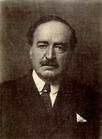<< | Índex | >>
Blasco Ibáñez and Blasquism

Blasco Ibáñez.
It is well known that Vicente Blasco Ibáñez (València 1867-Menton [France] 1928) was one of the most important figures in València at the beginning of the 20th century. A prolific writer (mostly in Spanish, after a brief start in Valencian), he was also a politician, which is why we include him here.
He founded a party, the Blasquist Party, and a movement, Blasquism, whose influence went beyond his death and spread to the end of the Second Spanish Republic.
This man, who, despite being born in València, his ancestors came from Mora de Rubielos (Teruel), wrote the vast majority of his literary work in Spanish, as we have already said, which is certainly not an example of love for his land or his language. Apart from all this, he inspired many Valencian writers to do the same as him.
But his party and political movement were sustained in two milestones: A radical anticlericalism, and a Spanish chauvinist republicanism. All this accompanied by an extremely aggressive theory and an extremely violent praxis (this violent element can also be found in later blaverism). Without exaggerating, it can be said that his movement was the equivalent of Lerrouxism in Catalonia. And, similar to Lerrouxism, this radical Spanish nationalism developed an anti-Catalan feeling.
Let's see Joan Fuster's judgement of what Blasquism meant in the Land of Valencia, in his famous book Nosaltres els Valencians [Barcelona. Editions 62. 1996. P. 112]:
"L’evolució del blasquisme, en definitiva, és la mateixa del lerrouxisme. De més a més, fou propulsor d’un matonisme obscenament inútil, que tenia tant de revolucionari com jo de cardenal. Tot això, en última instància, pertany al capítol del «provincianisme» més descordat. Des del punt de vista que ara ens ocupa, Blasco va significar un obstacle per a la Renaixença política, quan ben bé podia haver-se’n apoderat de les regnes. La seva herència pesarà sobre una part del republicanisme valencià del segle XX: aquells còmics «autonomistes» que sistemàticament combateren o boicotejaren les autèntiques aspiracions autonòmiques locals. Si dins el blasquisme tampoc no faltaren homes més o menys conscients del problema valencià, i fins i tot noblement preocupats per una solució digna —Vicent Marco i Miranda, entre altres—, sempre foren contrarrestats o cohibits."
"The evolution of Blasquism, in short, is the same as that of Lerrouxism. Blasco was the driving force behind an obscenely useless behaviour of political bullying, who was as revolutionary as if I were a cardinal. All this, in the last analysis, belongs to the chapter of the most extravagant "provincialism." From our point of view, Blasco was an obstacle to the Valencian political renaissance, when he could well have taken over the command of it. His legacy will weigh on a part of the Valencian republicanism of the twentieth century: those comedic "autonomists" that systematically fought or boycotted real local autonomic aspirations. Even when inside Blasquism there were figures who were more or less aware of the Valencian problem, and even nobly concerned with a dignified solution -Vicent Marco i Miranda, among others-, they were always countered or restrained."
There is also a clear prove of Blasco Ibáñez's anticatalanism. And that is the article La lepra catalanista (Catalanist Leprosy). This article appeared on the newspaper from the city of Valencia "El Pueblo", which was personally ruled by Blasco Ibáñez, on 13th June 1907. The article has an anonym author, but Blasco Ibáñez's authorship has been noticed by everyone, except for some historians of neoblaverist tendency, such as Vicent Baydal, who try to deny Blasco Ibañez's authorship of this article. In any case, it was very common that Blasco himself published anonym articles or articles signed with pseudonym. Finally, he was the director of this newspaper, and therefore he was the ultimate responsible of everything that was published in that newspaper. Thus, his authorship of this article seems quite clear.









